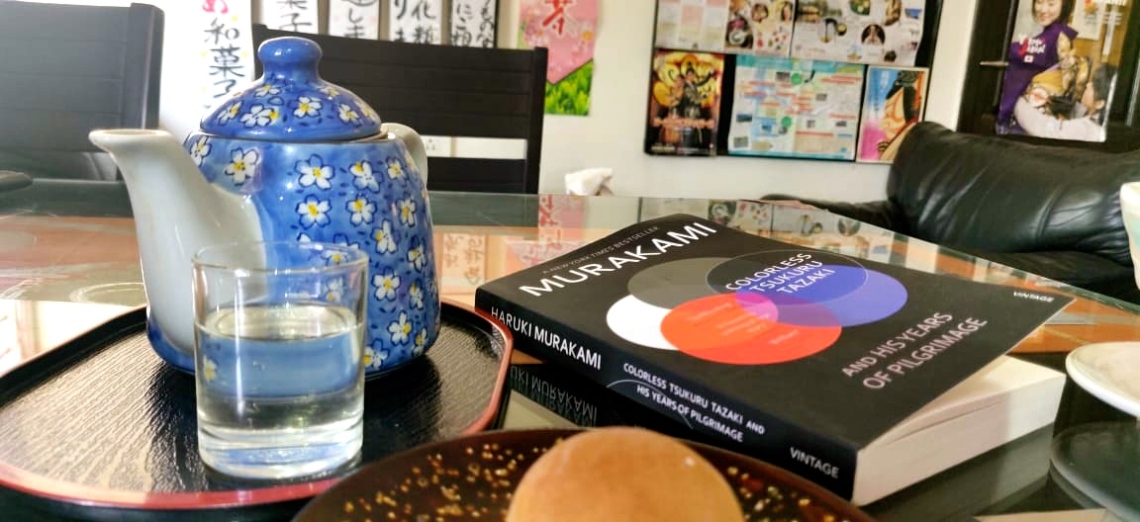One of the aspects that struck me the most about Colorless Tsukuru Tazaki and His Years of Pilgrimage is that it’s a story of friendship. What sort of role do friendships play in shaping our sense of self and identity? How rare friendships, when they happen in real life, is the kind of stuff we don’t tend to easily forget.
Tsukuru has never really felt like he fit in anywhere. Even as a kid, when he meets a group of four others (two boys and two girls) all of whom have names that stand for colors, Tsukuru feels like the odd one out. This is because his name is devoid of any color and therefore he feels like he lacks personality. Tsukuru invests so much in these friendships, that when the time comes for him to take a different route in life, he experiences a great sense of loss. He feels like he has lost a part of himself. Tsukuru finds it difficult to be truly vulnerable and intimate with anybody because these friendships abruptly end with no explanation being offered. One day, sixteen years later, he meets a woman who tells him to find out what the four are up to so that he can piece himself back together again.
This is a character-driven novel and the psychology of the main character Tsukuru is by far, the most intriguing. A character who has both darkness and goodness in him, Tsukuru is at times an enigma. While we get a clear picture of who he is at a superficial level (he loves swimming, classical music, isn’t outgoing, etc), we don’t really get too much insight into his innermost thoughts and feelings. His subconscious dreams only hint at his deepest desires. Whether or not he truly harbored such desire remains a mystery.
Intertextual elements like the mention of classical music scores really add to the experience of reading this novel. As characters listen to music, readers too feel drawn to the beauty of an innocent indoor scene that’s being painted by Murakami with the help of words. When Murakami describes such things, it feels like “time” in the real world and book world has stopped. This is because we are all just taking a moment to absorb what’s happening in the text.
The writing in this book is beautiful. Reading Murakami is like going about ordinary life but with special lenses on. He knows how to use language in such a way as to infuse life into the mundane. His writing is contemplative in tone and attempts to make sense of the routine momentum of everyday life.
“Unceasing crowds of people arrived out of nowhere, automatically formed lines, boarded the trains in order, and were carried off somewhere. Tsukuru was moved by how many people actually existed in the world. And he was likewise moved by the sheer number of green train cars. It was surely a miracle he thought – how so many people, in so many railroad cars, are systematically transported as if it were nothing. How all those people have places to go, places to return to.”
If you read his sentences, you’ll feel like your ordinary life makes a whole lot more sense. Like all Murakami novels in this too, we get to see regular people working at ordinary day jobs. This makes the plot highly relatable.

The experiences of Tsukuru that he shares with his friends are not isolated ones. It feels like such things are truly plausible and that most of us have experienced very intense friendships at one point or other. In this sense, his writing tries to bring out the authenticity of human relationships. He does not hesitate to flash a light upon the flawed and imperfect ways in which people go on about their lives. There is no rule book. There is no clear sense of right and wrong. This also happens to b the realm in which his text operates.
Tsukuru is in a sense, a representation of all of us. For most of our lives, we grope in the dark, not knowing our purpose and feeling like we don’t belong anywhere. We leave bits and pieces of ourselves with the people who impact us the most or at the places we travel or we lose parts of ourselves when we stop doing what we love doing and so on.
Tsukuru is very human because he has both qualities of darkness and light within him. As all humans do, we are capable of equal amounts of good and bad as proven in the course of history. This book is merely something you pick up to read in order to later contemplate on the beautiful chaos that is life. How it is possible to merely float through life, without questioning things, until we reach a point where we cannot move forward without taking a few glances backward. This story is one wherein we see how the past can come creeping up to someone in the present. It forces them to seek closure and by doing so, the character experiences growth and leaves behind their former stagnated state.
In the first half of the book, Murakami employs a slow, melancholic tone and in the second half, the pace really picks up as we are nearing the end of Tsukuru’s personal pilgrimage. This is significant because as the protagonist finally gets that sense of closure he so badly deserves, so too does the reader. Until then, we read on hopelessly feeling as if Tsukuru may never find his answers. While it is true that the end is open to interpretation, we still get a sense that this character (whom we’ve seen at his worst and best and have therefore grown to care for) is going to be alright.
Verdict: 4/5 stars.
